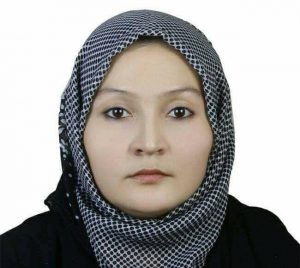We Will not Retreat; Even A Single Step

Acceptance of possible restrictions on women’s rights in peace talks has been a major concern since the beginning of the talks among officials and staff of governmental and non-governmental organizations active in the women’s sector. Some of these people say that Afghan women have struggled in recent years to achieve what they have and their rights cannot be traded.
The government has assured women that they will defend their rights. However, Mrs. Rasooli said that women will stand against any decisions that could jeopardize their rights. “We will not retreat; even a single step. We will not allow the government to trade even a part of our rights and establish peace in which the rights of half the population of the country is ignored.” Said Mrs. Rasooli.
Network: Do women in the negotiating team have the ability to defend women’s rights?
Rasooli: Female representatives can certainly be effective if they thoroughly defend women’s rights and their achievements of the past two decades. I think that men can never defend women’s rights because only a woman can understand the problems of women and the pain they endure. Therefore, it would have been better if more women from different social backgrounds and different provinces could participate in peace talks. Nevertheless, we hope the female representatives, despite their low presence, can defend the rights and achievements of women.
Network: What issues should be emphasized upon with regards to women?
Rasooli: Women have made significant achievements both at education and work which is confirmed by their active participation. These achievements have been gained through years of struggle and should not be ignored. Women’s right to education and employment, which is also provided by Islam must be protected as red lines. Additionally, most families have lost a male member, and their survivors, especially homeless women, should be allowed to share their views and objections in peace talks. Transitional justice must be implemented. Families of the victims must be redressed. In the future government, widows, orphans, and families of the dead soldiers must be paid attention to. What we have now is the result of their sacrifices.
Network: What positive changes have been made with regards to women’s situation in Helmand over the past two decades?
Muqaddas Rasooli: In the last two decades, in Afghanistan in general and in the southwestern region in particular, there have been many positive changes with regards to women’s situation.
For example, fifteen years ago, we did not have a university with female students, but now hundreds of girls graduate from university every year with a bachelor’s degree working in different sectors. Teachers, doctors, and midwives are important needs that we were deprived of in the past and now many women work in these sectors. Another progress we have made is the establishment of a special prosecutor’s office for women. In general, it can be said that Helmand women have made significant progress in the last two decades.
Network: How will the Taliban’s participation in the government affect women’s activities?
Rasooli: Afghanistan is an Islamic country. Therefore, its laws are not against Islamic norms and Sharia. The Taliban should know that women’s activities are not against the teachings of Islam, and if they participate in power, the Taliban should not oppose it. On the contrary, they should allow women to study and work in different sectors. We do not want a government in which once again confine women to their homes and deprive them of their education and activities. The Taliban must accept women’s demands which are protected by Islam, and not interpret them in their favor. The rights of women as half the country’s population should be given serious attention and they should be able to participate in various areas, including politics.
Network: What is your main concern about the outcome of the peace talks?
Rasooli: According to history, the Taliban treated women inhumanely during their rule, and we do not want that period to be repeated. Women have realized their rights and fought for them for years. If the Taliban rule is to be repeated, women may stand up to it so that no one can deprive them of their rights.
Network: Which individuals or groups are responsible for guaranteeing commitments made in peace talks?
Moqaddas Rasooli: I have asked the question on several occasions whether the Afghan government has the capacity to guarantee the commitments made in the peace talks. It is obvious to all Afghans, and a review of history reveals that the promises have been less fulfilled. If the Taliban are really from Afghanistan, they must cooperate with the Afghan government in the face of the intervention of neighboring countries and, as a result, fulfill their obligations. On the other hand, the international community and the countries involved in the peace talks must also ensure that the commitments are fulfilled.
She said that the government negotiating team must be very careful about protecting women’s rights and try to advance the dialogue in a way that provides a conducive environment for more women to work and progress in society.